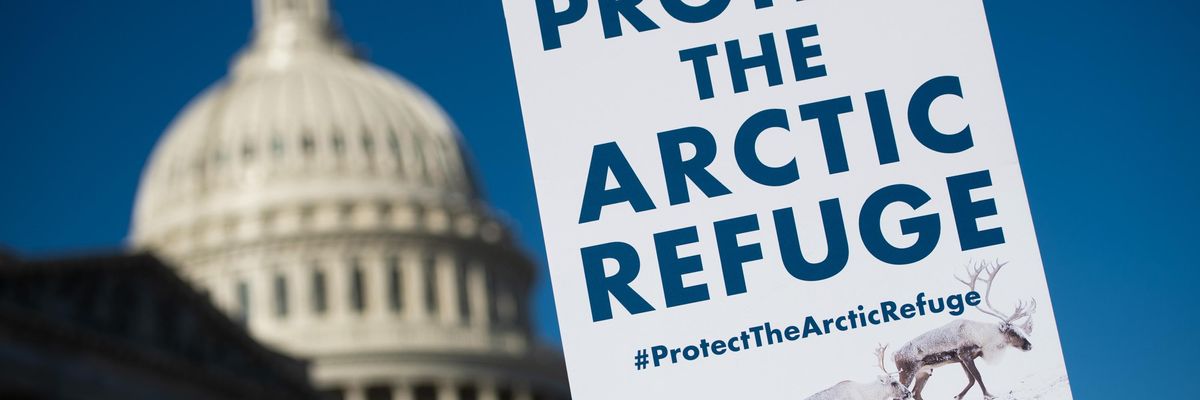Defenders of Alaska's Arctic National Wildlife Refuge on Monday welcomed ExxonMobil's statement to shareholders that the fossil fuel giant has no plans for drilling in ANWR but also renewed calls for Congress to pass legislation to protect the region once and for all.
"This is a significant win for the Arctic and for the climate. Don't just take our word for it, take Exxon's: Oil and gas drilling in the Arctic is bad business," declared Sierra Club senior campaign representative Mike Scott, urging President Joe Biden to "seize this opportunity to permanently protect the Arctic National Wildlife Refuge and the people who depend on it."
Congressional Republicans and then-President Donald Trump opened up ANWR to fossil fuel development with their 2017 tax package. After taking office in 2021, Biden issued an executive order to halt drilling activity in the refuge, and later that year, his administration launched a new environmental review of the leasing program for the area.
However, neither Biden nor Congress has heeded calls from Indigenous and climate leaders who want to protect the refuge from fossil fuel development that would endanger local wildlife, sacred land, and the warming planet.
"ExxonMobil is recognizing what others have been saying for years: High-risk drilling for Arctic oil on land that is sacred to Indigenous people is bad business."
ExxonMobil's new comments about ANWR came in a proxy statement sent to shareholders last week ahead of the May 31 annual meeting. The company's board of directors urged shareholders to vote against a Green Century Capital Management proposal that would require a new report on the pros and cons of not engaging in oil and gas exploration and production in the Arctic Monitoring and Assessment Program (AMAP) region, particularly within the refuge.
Explaining its opposition to the proposal, ExxonMobil's board called the Green Century Capital Management's motives "disingenuous" and argued that its existing reporting is sufficient. The board also highlighted that "ExxonMobil does not hold any active leases and is not pursuing any active developments within the Arctic National Wildlife Refuge (ANWR)."
Additionally, the board said, "our current investment plans do not include exploration activity within the Arctic Monitoring and Assessment Program (AMAP) region, and we plan relatively limited investment to sustain our existing interests in the region."
Noting that ExxonMobil's statement comes after "Chevron, Hilcorp, and 88 Energy canceled their Arctic Refuge leases last year," Environment America Public Lands campaign director Ellen Montgomery urged Congress and the Biden administration "to act to permanently protect this special place."
Karlin Itchoak, Alaska regional director for the Wilderness Society, similarly said that "ExxonMobil is recognizing what others have been saying for years: High-risk drilling for Arctic oil on land that is sacred to Indigenous people is bad business."
"The calving ground of the porcupine caribou herd is not only a beautiful, wild place that is worthy of protection. It is vital to the food security and cultural survival of local communities," Itchoak added. "Other industry leaders should follow ExxonMobil's example, and Congress must act to protect for future generations."
Bernadette Demientieff, executive director of the Gwich'in Steering Committee, also urged "all companies—and their investors—to reject development in ecologically sensitive and biologically rich areas that would threaten lands, water, wildlife and a way of life for the Indigenous peoples that have occupied these lands for thousands of years—including Iizhik Gwats'an Gwandaii Goodlit (the sacred place where life begins)."
"Many of these are not only important to protect for our future generations but are sacred to the people who have cared for these lands since time immemorial," Demientieff added. "Companies or money cannot divide our people from our lands that are sacred. We are asking for ExxonMobil and all companies to respect our rights, including our right to free, prior, and informed consent."
While acknowledging that ExxonMobil's current position "addresses the concerns of the Gwich'in," First Peoples Worldwide executive director Kate Finn stressed that "without a comprehensive policy to operationalize free, prior, and informed consent, companies remain exposed to economic and legal risks that come from a failure to respect Indigenous peoples' rights."
Kristen Miller, executive director of Alaska Wilderness League, also welcomed ExxonMobil's move and pointed out that it "fits with the larger trend," before highlighting other fights related to climate-wrecking fossil fuel development.
"Exxon's response to this shareholder resolution demonstrates clearly that big corporations have read the handwriting on the wall. Arctic oil extraction isn't worth the risks," said Miller. "We now look to ConocoPhillips, which has yet to make a final investment decision on the Willow project, and urge them to see that investing in Arctic oil is a bad business decision."
The Biden administration came under fire last month for greenlighting the 30-year Willow project, which green groups are challenging in court. The administration faced further criticism last week for approving a proposed liquified natural gas project in Alaska.
"Right after the horrific Willow decision," said Center for Biological Diversity attorney Liz Jones, "it's painful to see Biden officials greenlight an even bigger fossil fuel project that will destroy Arctic habitat and feed the climate crisis."

